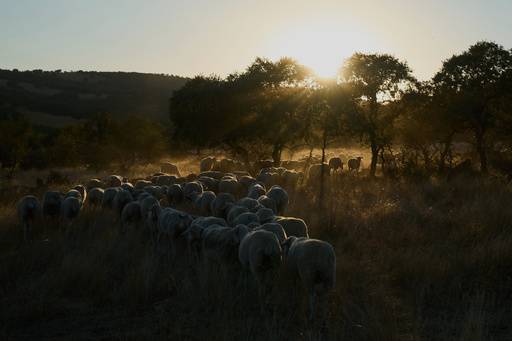Neglected trade in Spain gets a boost from African migrants

LOS CORTIJOS, SPAIN—The bells and bleats faded as Osam Abdulmumen, a migrant from Sudan, herded sheep back from pasture, the sun setting over a centuries-old farm in Spain’s arid heartland.
From dawn to dusk, Abdulmumen, 25, has looked over a flock of 400 animals for months in Los Cortijos, a village of 850 people in the plains of Castile-La Mancha, the region in central Spain made famous by the 17th-century classic “Don Quixote.”
Los Cortijos is among hundreds of rural villages and towns in the region coping with depopulation that has made it tough to fill a job that has existed since biblical times, but which Spaniards seldom pursue these days: shepherding.
To fill that gap and also find work for recent migrants, a government program is training arrivals like Abdulmumen—many from countries in Africa, but also from Venezuela and Afghanistan—whom local farms depend upon to herd the animals whose milk produces central Spain’s prized sheep’s milk cheese.
“I always wanted to work in my country, but there are too many problems,” Abdulmumen said inside his tidy, bare one-bedroom apartment in town, speaking in his limited Spanish. He said he left because of violence but was reticent to say more. “My family can’t do much right now. That’s why I want to buy them things. A house, too.”
The challenges of finding workers in rural Spain are personal for Álvaro Esteban, the fifth-generation proprietor of the farm. Esteban left Los Cortijos himself for eight years, first to study history at a nearby university, and then to Wales, where he worked odd jobs before returning home during the COVID-19 pandemic.
Hoping for a future
“I didn’t see my future here,” said Esteban, 32. “But due to life circumstances, I decided to come back and … being here made me say, ‘Well, maybe there is a future.’”
Spain’s interior has experienced decades of rural exodus, starting around 1950, as generations of young people left the countryside in search of work and opportunity in cities. Today, about 81 percent of the country’s residents live in urban areas. In 1950, about 60 percent did, according to the Bank of Spain.
Farmers and other agricultural laborers represent less than 4 percent of Spain’s working population, even as the country is one of Europe’s leading agricultural producers.
After he came back, Esteban took the same shepherding course as Abdulmumen, and looked at how he could modernize his family’s farm. He works alongside his 61-year-old father and Abdulmumen, using drones to monitor the animals and pastures. He also makes cheese that he later sells at markets and to restaurants.
The new shepherds begin their training in a bare classroom just outside the fortressed medieval city of Toledo, where, on a recent morning, nearly two dozen migrants learned about coaxing flocks of sheep, handling them and guiding suction cups onto their teats.
Fundamentals
They are taught the fundamentals over five days—just enough time to convey the basics to students who often speak only halting Spanish, but are eager to work. After a day of on-site training, and if they are authorized to work in Spain, they can apply to be matched with a farm.
Sharifa Issah, a 27-year-old migrant from Ghana, said she wanted to train to work with sheep because she had tended to animals back home.
“I’m happy with animals,” Issah said.
Since 2022, about 460 students, most of them migrants, have gone through the program, which is funded by the regional government, according to program coordinator Pedro Luna. Besides the 51 graduates now employed as shepherds, another 15 work at slaughterhouses, he said, while others found jobs on olive and other fruit farms.
Many students are asylum-seekers, like Abdulmumen, who is from the Sudanese region of Darfur. Organizations, including the International Red Cross, connect migrants with Luna’s program.

















The bleak future of our atomized labor force